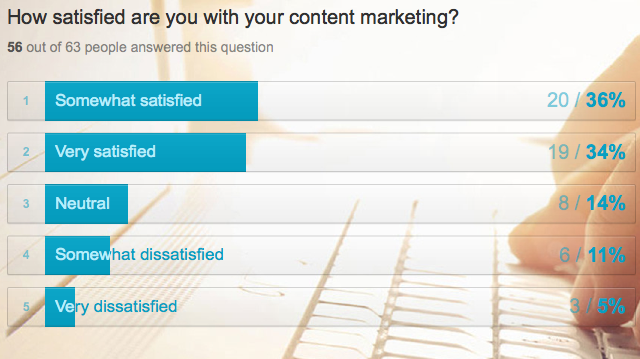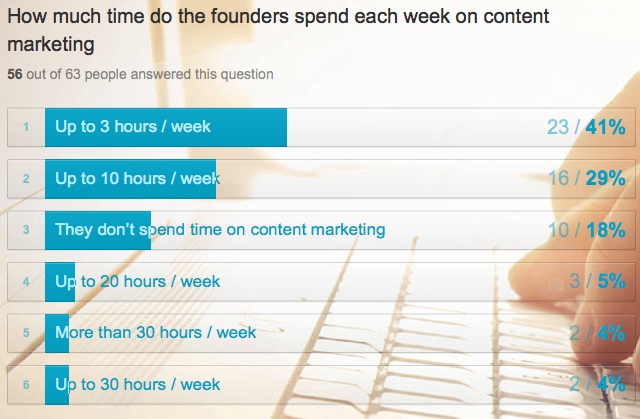Is your startup using content marketing as a growth channel?
If you answered “yes” to the question, you are in the majority. According to Semrush, as reported in this 2022 survey, 79% of companies use content marketing.
That’s a big number taking up a content marketing strategy, but how well are they really doing?
We’ve found some startups such as Design Pickle whose first 1,200 clients were driven in through guest posting and content.
Blue Apron grew by 500% in 2015, attributed to providing a great service and savvy content marketing strategies and there are many more who we could mention. While some will not be successful with it, we do know that 70% of startups are happy with their content marketing efforts.

Source: WP Curve
Our position is that content marketing is an important, if not THE most important, growth strategy for your startup. Here’s why:
Content Has Influence Over Other Strategies
Your content marketing efforts can have an affect on almost any other online strategy you have. For example:
- Want people signing up to your email list? Content can drive that.
- Working on SEO strategy? Relevant, quality content can help drive traffic and boost your SEO.
- Wondering what to post on social media? Sharing your blog posts is one important strategy.
- Want to find a way to connect with influencers or make other valuable contacts? Mentioning them in your content gives you a good excuse to reach out on social media.
- Looking for a better way to onboard your SaaS sign ups and give them the information they need for success? Do it with content!
Basically, content can form the basis of many of your other strategies, including as a lure to drive more traffic to your website.
Besides that…
Content Develops Your “Voice”
Every business would like to have some kind of sway over its audience, right? Content is a great vehicle for developing an authoritative voice and cementing your brand in the minds of your audience.
It’s about building authority and reputation, even a voice of influence. Smart content communicates that you are a desirable business to be following.
Content Marketing Is Cheap
Startups: unless you’ve received some kind of large funding round, you’re probably breaking out the ramen and trying to save on costs where you can. Usually the biggest chunk of cash is going into product development, and you’re probably needing to shoestring the marketing as much as possible.
Hello content.
This is the thing, almost anyone can produce content (though please, that doesn’t mean everyone should!). There are now dozens of free or very inexpensive channels through which you can create and distribute content to a wider audience.
According to Neil Patel, content marketing costs 62% less than traditional marketing and generates about three times as many leads. More leads, less cost? Yes!!
You Can Leverage Established Audiences
We mentioned Design Pickle earlier and this was something they did well. Founder Russ Perry credits some of his rapid growth with a strategy for guest posting on influential blogs. He also mentions that booking the guest spot really gave him a push to actually get the content flowing, as he was accountable to someone else.
The key for your startup to best use this strategy lies in choosing established blogs which have a large audience who lie within your identified target audience. Keep a list or spreadsheet of those blogs and check as to whether they publish guest posts.
Bear in mind that if you don’t hear from some of the big ones, there are plenty who are not quite as big, but who nonetheless have a good, established audience who are worth trying. These ones often don’t have as many requests for guest posts and may come back to you more quickly.
Good Content Can Be “Evergreen”
“Evergreen” content is the kind which never gets old. If you’re able to produce some good pieces, you will find they attract traffic for years to come. This means choosing topics which aren’t simply trends, because those will have an expiry.
What questions or problems do your clients have which will always require an answer? Those are the kinds of things to be targeting for evergreen content, even if you update them every so often for technology changes.
Startups Tend To Lead The Pack
Hey, if you look at the overall results from WP Curve’s survey and compare them with those of Content Marketing Institute, the numbers of startups satisfied with their content or who saw themselves as effective is higher.
When you think about it, you do have room to lead the way. As a smaller company, you’re more agile and tend to be able to make decisions and build strategy quickly. You’re probably also better placed to develop a consistent schedule and build a relationship with your audience outside of corporate anonymity.
This is backed up by research from Joe Pulizzi of Content Marketing Institute:
“It’s so simple, yet so hard for even mid-sized companies to do this. With financial expectations on a quarterly basis at best, few larger companies have the patience to build a loyal relationship with an audience. In addition, budgets are set up as time-based campaigns, where short-term objectives take priority. That means the business tries to monetize the content program before the audience is ready (a big mistake).”
Pitfalls To Watch For
There are always going to be a few pitfalls, so let’s check out some of the most common faced by startups:
Time
Creating content requires time, potentially a lot of time. It may involve research, interviews, filming, audio recording, or just a lot of time gathering and writing down your thoughts.
Another point WP Curve picked up in their survey was that startups who saw the best success from content marketing were those who stuck with it. Obviously, sticking with it involves a considerable time commitment, especially if you haven’t yet delegated content to someone other than founders.
Content marketing is a long-term strategy. Your brand new startup generally needs to be producing content for a few months to really see results. At the same time, you can’t expect that people will simply come if you create the content. You need to be working to get that content exposed on various other channels (content amplification techniques).
Quality
You know how we mentioned that while anyone can produce content, that doesn’t mean everyone should? Quality is a key factor in producing effective content and not everyone is up to producing content of sufficient quality (perhaps affected by the time factors mentioned above).
If your startup falls into the “quick, we need some content” trap, you might find that quality suffers and you’re not doing your reputation any favors with it. Or, perhaps worse, poor quality content could negatively impact your search rankings.

Source: Moz
Founders Spending Too Much Time On It
Sometimes it’s a great idea for founders to put out some content themselves. Inside stories and case studies can go down very well with audiences, and founders tend to be the ones best-placed to talk about them.
However, there definitely reaches a point where founders are spending too much time on the blog — time which could be spent on other important business activities.

Source: WP Curve
Up to 3 hours per week might be quite reasonable to you as a founder, but beyond that? That’s probably heading into territory where you need to be looking to hand off the content tasks (something Audience Ops exists to help with!).
Final Thoughts
If you are a startup, content marketing done well will be your most important growth channel. There is enough evidence to show that it works and that startups are in a good position to lead the pack when it comes to content strategy.
Content is a relatively inexpensive form of marketing and gives you the opportunity to showcase your expertise and develop an authoritative voice. It impacts almost every other digital strategy you may have.
Is it your most important growth channel? You decide…